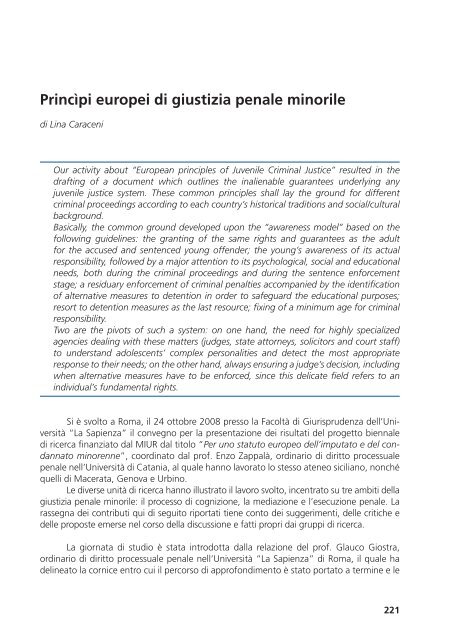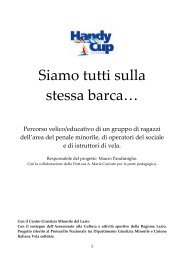Scarica il documento - Dipartimento per la Giustizia Minorile
Scarica il documento - Dipartimento per la Giustizia Minorile
Scarica il documento - Dipartimento per la Giustizia Minorile
Create successful ePaper yourself
Turn your PDF publications into a flip-book with our unique Google optimized e-Paper software.
princìpi europei di giustizia penale minor<strong>il</strong>e<br />
di Lina Caraceni<br />
Our activity about “European principles of Juven<strong>il</strong>e Criminal Justice” resulted in the<br />
drafting of a document which outlines the inalienable guarantees underlying any<br />
juven<strong>il</strong>e justice system. These common principles shall <strong>la</strong>y the ground for different<br />
criminal proceedings according to each country’s historical traditions and social/cultural<br />
background.<br />
Basically, the common ground developed upon the “awareness model” based on the<br />
following guidelines: the granting of the same rights and guarantees as the adult<br />
for the accused and sentenced young offender; the young’s awareness of its actual<br />
responsib<strong>il</strong>ity, followed by a major attention to its psychological, social and educational<br />
needs, both during the criminal proceedings and during the sentence enforcement<br />
stage; a residuary enforcement of criminal penalties accompanied by the identification<br />
of alternative measures to detention in order to safeguard the educational purposes;<br />
resort to detention measures as the <strong>la</strong>st resource; fixing of a minimum age for criminal<br />
responsib<strong>il</strong>ity.<br />
Two are the pivots of such a system: on one hand, the need for highly specialized<br />
agencies dealing with these matters (judges, state attorneys, solicitors and court staff)<br />
to understand adolescents’ complex <strong>per</strong>sonalities and detect the most appropriate<br />
response to their needs; on the other hand, always ensuring a judge’s decision, including<br />
when alternative measures have to be enforced, since this delicate field refers to an<br />
individual’s fundamental rights.<br />
si è svolto a roma, <strong>il</strong> 24 ottobre 2008 presso <strong>la</strong> Facoltà di Giurisprudenza dell’università<br />
“<strong>la</strong> sapienza” <strong>il</strong> convegno <strong>per</strong> <strong>la</strong> presentazione dei risultati del progetto biennale<br />
di ricerca finanziato dal Miur dal titolo “Per uno statuto europeo dell’imputato e del condannato<br />
minorenne”, coordinato dal prof. enzo zappalà, ordinario di diritto processuale<br />
penale nell’università di Catania, al quale hanno <strong>la</strong>vorato lo stesso ateneo sic<strong>il</strong>iano, nonché<br />
quelli di Macerata, Genova e urbino.<br />
le diverse unità di ricerca hanno <strong>il</strong>lustrato <strong>il</strong> <strong>la</strong>voro svolto, incentrato su tre ambiti del<strong>la</strong><br />
giustizia penale minor<strong>il</strong>e: <strong>il</strong> processo di cognizione, <strong>la</strong> mediazione e l’esecuzione penale. <strong>la</strong><br />
rassegna dei contributi qui di seguito riportati tiene conto dei suggerimenti, delle critiche e<br />
delle proposte emerse nel corso del<strong>la</strong> discussione e fatti propri dai gruppi di ricerca.<br />
<strong>la</strong> giornata di studio è stata introdotta dal<strong>la</strong> re<strong>la</strong>zione del prof. G<strong>la</strong>uco Giostra,<br />
ordinario di diritto processuale penale nell’università “<strong>la</strong> sapienza” di roma, <strong>il</strong> quale ha<br />
delineato <strong>la</strong> cornice entro cui <strong>il</strong> <strong>per</strong>corso di approfondimento è stato portato a termine e le<br />
221





